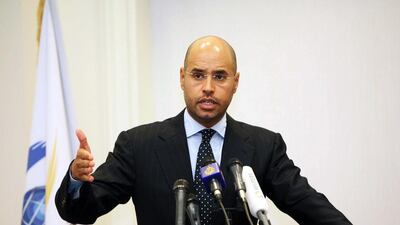Saif Al Islam Qaddafi, one of the sons of Libya’s late leader Muammar Qaddafi, has been freed by the militia that held him for the past five years, adding a new wild card to the country’s already confused political dynamics.
Saif’s captors, the Abu Bakr Al Siddiq battalion in Zintan, a hill town south-west of the capital Tripoli, said they had freed him and he had left the town on Saturday, following an amnesty issued by the country’s eastern-based government in Tobruk, the House of Representatives (HOR) parliament.
The battalion was a rebel militia during the 2011 revolution against Muammar Qaddafi, battling his forces in the west of the country, and the capture of Saif was seen by revolutionaries as a great triumph.
However, in July 2014 former rebel forces began Libya’s ongoing civil war, with some supporting the UN-backed Government of National Accord (GNA) in Tripoli and others, including Zintan militias, backing its rival Tobruk parliament. As time has gone on, animosity among many pro-Tobruk forces towards the Qaddafi family has lessened.
The Abu Bakr Al Siddiq battalion said they released Saif to comply with the amnesty granted him by the Tobruk parliament last year, though some observers think Zintan sees an advantage in winning support from some members of the Qaddafi family in the struggle against the GNA.
The battalion, which supports the HOR, did not disclose Saif’s destination and there were contradictory reports in Libya on Sunday about whether he had in fact left the town. His lawyer, Khaled Al Zaidi, said Saif was headed to another Libyan city, but he could not say where for security reasons.
However, the GNA has refused to accept the amnesty. The GNA is upholding the 2015 verdict of a Tripoli court which tried Saif in his absence and sentenced him to death for crimes committed during the 2011 revolution that deposed his father.
Saif, 44, is the second son among Qaddafi’s eight children and was widely seen as his father’s key diplomatic envoy. The International Criminal Court chief prosecutor at the time, Luis Moreno-Ocampo, described him as Libya’s “de facto prime minister”.
Saif has also been indicted by the ICC in The Hague for charges including crimes against humanity and war crimes.
While Saif can travel freely around parts of Libya under the Tobruk government’s control, he faces arrest if he enters territory held by the Tripoli government.
He backed his father in the eight-month revolution, in which Nato air power proved decisive in the victory of the rebel forces, who captured and killed Qaddafi in October that year. Saif fled south but was captured a month later by the Al Siddiq battalion which intercepted his jeep convoy in the south-western desert.
He has been held in Zintan since then, with the militia refusing demands from successive Tripoli governments and the ICC to hand him over to their jurisdiction.
If his freedom is confirmed, Saif may seek to take advantage of the country’s changing political fabric.
Many Libyans, aghast at the upheaval and civil war that have emerged since the revolution, hark back to the days of Qaddafi, arguing that his rule – for all its corruption and oppression – was more stable than the anarchy the country endures now.
Forces that backed Saif’s father in the revolution, notably the Qaddafi tribe in the south-west of the country, are likely to give him their political backing.
He can also count on support from his sister, Aisha, and brother Mohammed in exile in Oman. Both fled, along with Saif’s mother Safia, to Algeria in 2011, and later moved to Oman. Aisha has since called for Saif’s release from custody insisting he is innocent.
His cousin Ahmed Qaddaf Al Dam, who has lobbied on his behalf from his base in neighbouring Egypt, is also a strong supporter. Mr Al Dam was briefly arrested under the former Muslim Brotherhood government in Cairo, but has enjoyed freedom under the current president Abdel Fattah El Sisi and will probably try to rally international support for Saif.
Sections of the HOR may also welcome Saif, seeing him as a bulwark in its battle against radical militias.
His release comes amid much political turmoil. The HOR’s Libyan National Army (LNA), under the command of Field Marshal Khalifa Haftar, this month captured the key strategic base of Al Jufra, ejecting the Benghazi Defence Brigades militia.
Meanwhile, this week saw Saudi Arabia and the UAE, supported by Bahrain and Egypt, issue a list of people and organisations designated as terrorists, including the Benghazi Defence Brigades and several prominent Libyan politicians opposed to the eastern parliament.
Field Marshal Haftar fought against Qaddafi’s forces during the revolution, but elements in Tobruk think that Saif’s presence might persuade key western Libyan tribes to form an alliance with them against Tripoli-based militias.
Crucially, Saif is popular among many of the Warfallah tribe in the western town of Bani Walid, where he hid in the dying days of the revolution before fleeing south. Bani Walid is listed by the LNA as its next military objective as it seeks to push towards the Libyan capital.
foreign.desk@thenational.ae

